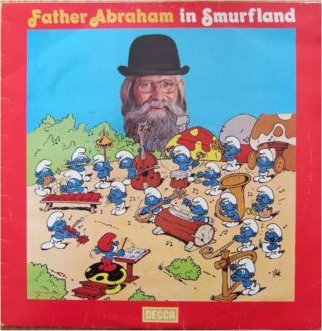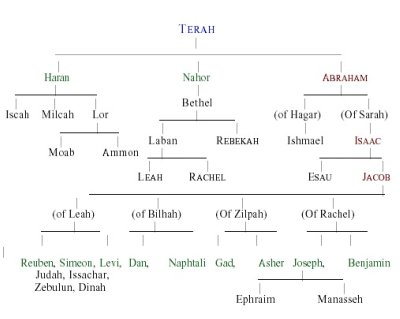Now these are the records of the
generations of Terah. Terah became the father of Abram, Nahor and Haran ; and Haran became the
father of Lot . Haran
died in the presence of his father Terah in the land of his birth, in Ur Haran Haran , his grandson, and Sarai his daughter-in-law, his
son Abram's wife; and they went out together from Ur
of the Chaldeans in order to enter the land
of Canaan ; and they went as far as Haran Haran
Now the LORD said to Abram,
"Go forth from your country,
And from your relatives
And from your father's house,
To the land which I will show you;
And I will make you a great nation,
And I will bless you,
And make your name great;
And so you shall be a blessing;
And I will bless those who bless you,
And the one who curses you I will curse.
And in you all the families of the earth will be blessed."
So Abram went forth as the LORD had spoken to him; and Lot
went with him. Now Abram was seventy-five years old when he departed from Haran Haran ,
and they set out for the land of Canaan ; thus they came to the land of Canaan
An ancient
family history, otherwise known as Genesis 11:27-12:5
Your
roving reporter, Marcella Gibbon, traveled recently from Ur
to the far distant land of Haran to find one of Ur Ur
The dashing Terah is certainly out
in the country, not a wall to speak of, but the lands around our host’s house
is filled with rich livestock, fat and sassy.
Surely there is not another landowner in Haran
After being honorably welcomed and seated upon some
lush, multi-colored pillows, your reporter embarked on the quest of discovering
the man behind the handsome mask.
“Terah, our readers so appreciate you opening your home to allow us to
discover a bit of your life.”
He
responded in his deep, resonating voice, “Of course, Marcella, you are always
welcome. Let me ask you, did you really
travel these thousand miles only to interview a simple country farmer?” So humble as well as his faint-worthy good
looks! His gaze was so direct, that your
reporter near blushed!
“Terah, please answer the question that everyone has
been asking—why did you leave Ur Ur
Our host leaned back on his pillows (which I am sure
was filled with the hair of less than year old goats!), “Marcella, it is a
simple matter, really. I was simply one
of the high priests of Ur
“A celebrated citizen, none the less.”
“But Terah, to be asked like this, did that not
upset you? To leave your home and your
high office?”
“It was hard to leave, to be sure. All my friends, all of the authority I had
established…. But it is a worthy thing to serve – in this way. No, I do not regret the council’s decision.”
“But Canaan , are
they not… barbarians? I have heard the
most gruesome stories…”
“Much of that is fiction, Marcella, as you must
surely know.” His eyes twinkled at this
point. “Surely the worshippers of – do
not sacrifice their first born, or require the burning of wives. I am sure they have the pure sexual practices
of the temples in Ur
“Of course, High Priest Terah. At the same time, I must admit that I have
noticed that you are not in Canaan, but in Haran
“Of a sort. I
was well on my way, having gone as far north as we could, and we were just
turning east for the second leg of the journey, when my health suddenly turned
for the worse. I knew at that point that
I would have been unable to survive all the distance to Canaan ,
with enough health to built the requested temple. Knowing that Haran
“A wise decision, I am sure, Priest Terah. I understand you have made some inroads in
the temple here in Haran
“They have been very generous to me, Marcella. I have been recognized a high priest here in
this temple, and given much authority over many of the lands in Haran
“And what about the commission to Canaan ? What is to become of the worshippers of –
there?”
“I have already sent out substitutes. Three lower priests of – volunteered and had
been commissioned to go to Canaan soon after
my arrival here.”
“So the Canaanites needs are being met?”
He smiled so warmly that my heart nearly melted.
“Certainly. It was never my intention to
leave them high and dry.”
“And how is your family, High Priest? They have surely been missed as well.”
“Fine, fine.
My wife is doing well…”
“And what of your son, Avram and his beautiful wife,
Sarai?”
At this he stammered a little, and found it
difficult to speak, “I… I am not sure.”
“But surely they are in good health?”
“I frankly have no idea.”
“Are you not speaking to each other? Has there been a split in the great family of
Terah?”
“Well, we could be speaking, except that, well, he
left me.”
“Oh, my! Did
he really? This is stunning!”
“Yes, yes, it is.
I am shocked, honestly.”
“I can imagine!
What possible excuse could he give?”
“I must admit, I heard what he said, but it made no
sense to me….”
Your reporter responds with the most sympathy she can muster, with a tear welling up in her eye, “Please explain, dear Terah.”
“He told me that he heard the voice of El Eloyah, the
Most High God. My son, he was the
greatest treasure of my life, but how could he be so focused on by the Most
High? No one I know has been spoken to
by the Most High…. In any case, my son claimed that the Most High promised him
a great inheritance—to become a great nation, to be thoroughly protected, to be
wealthy beyond measure.”
“This sounds wonderful.”
“Oh, yes—if it were true. Honestly, and I say this off the record, my
son and his wife were not even so blessed by any god to even have one
child! This is not the sign of
blessing! To hear such ramblings is
grandiose nonsense!”
“Now, Terah, this still did not explain why he
left.”
“Well, this so-called Most High supposedly told him
that if he were to receive this inheritance from the gods, he would have to
leave me and go to another land.”
“Is that right?
And what land is this?”
“He wouldn’t say!”
“Avram wouldn’t tell you?”
“No—the god who spoke to him wouldn’t tell him! He was just to wander about aimlessly until
he reached the land he was to be promised.
Then he was to stop and camp there.”
“To build a city?
To settle down?”
“No—to camp! To wander his life as a nomad, a barbarian!”
Your truest scribe was sincerely shocked! “Surely you tried to talk him out of
this foolishness!”
“Of course I did! I lectured him for hours! I told him of the idiocy of listening to
unknown spirits, and believing everything they said. I told him of the dangers of the world, and
how he was bringing his family into needless harm. I told him of the inheritance I had built
here, for him, and that he need go no where to obtain a rich, plentiful
inheritance. How, as my son, he could be
a priest, leading many women into worship, and so gain eternal fame and life.”
“And what did he say?”
“Nothing. He never spoke much. He did as he always did. He listens and listens without a word and
then does as he wishes. He is so
stubborn.”
“Have you heard anything from him?”
“No.
Nothing. And I will not. And there is no way for me to find him. I have lost him forever.”
At this point we sat in silence,
mourning the loss of his son, when your reporter remembered another joy in
Terah’s life.
“High Priest Terah, what about your
grandson, Lot ?
Surely he is well?”
“He left with Avram to parts
unknown.”
At this point, dear readers, your
favorite essayist, Marcella Gibbon, was at a loss.
Terah—dear, wonderful Terah—suffered so much at the hands of his son,
that the interview was in tatters. At
the same time, your reporter has an insatiable curiosity. How could such a celebrated young man such as
Avram, turn against his father in such a ruthless way? Did he really hear a god, or did he make it
up to leave his father? And if he did
hear a god, what kind of god would require the loss of his family, the loss of
all earthly inheritance, in order to receive the blessings of the god, no
matter how generous? Your reporter will
not stop until she knows the answers to these questions.
Meanwhile, the interview must be
salvaged. “High Priest Terah, I have
heard so much of the temple of – in Haran
Shaking his head of the cobwebs of
loss, Terah replied, “Of course, and more!”
“Could you possibly offer me a tour
of it, so our readers could experience it’s glory?”
“Surely, yes…”
“And, perhaps you could lead me in
worship?”
His full smile returned, with his
eyes glistening, “Of course, Marcella. I
would be happy to.”





No comments:
Post a Comment